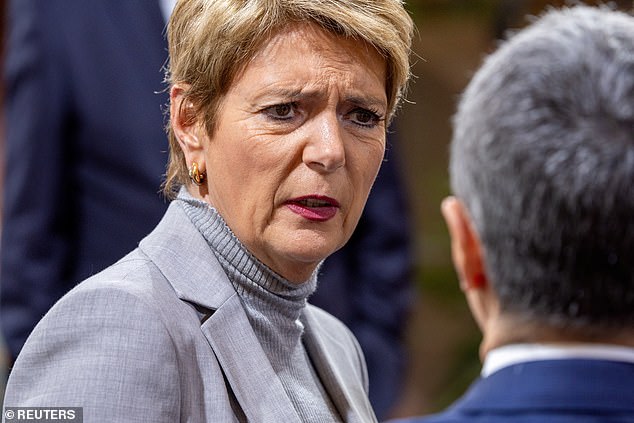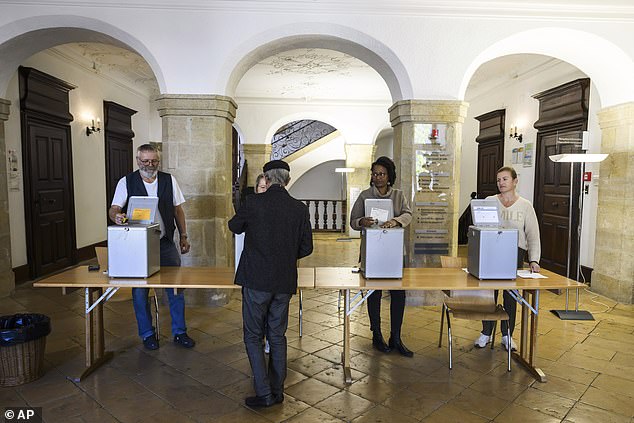Switzerland will cap its population to 10 million in immigration crackdown under plans put forward by hard-right People’s Party
Switzerland will cap its population at 10 million as part of a crackdown on immigration, under plans by the far-right People’s Party.
The Swiss People’s Party (SVP) – the largest in the four-party ruling coalition – launched the anti-immigration initiative last year, which was signed by more than 115,000 residents and could come to a vote as early as 2026.
The initiative requires that the population of those living permanently in Switzerland does not exceed ten million inhabitants before 2050, after the country reached almost nine million inhabitants for the first time in 2023.
Once the population reaches nine and a half million, the initiative will require “temporarily admitted persons” [foreigners] does not receive a residence or settlement permit, Swiss citizenship or any other right of residence.’
After 2050, the initiative calls for the Federal Council to set a new immigration limit based on the surplus of births.
Swiss Finance Minister Karin Keller-Sutter has called the SVP campaign “dangerous” and a threat to companies’ ability to attract top talent from abroad.
Representatives of the Swiss People’s Party (SVP UDC) stand next to a banner that reads in German: ‘No 10 million Switzerland! sustainability initiative’ after handing over signatures needed for a Swiss popular initiative to vote to limit population growth in Switzerland, in Bern on April 3, 2024

Swiss Finance Minister Karin Keller-Sutter calls the proposal “dangerous” and a threat to companies’ ability to attract top talent from abroad.
She said at a Bloomberg event: ‘When people talk about immigration or migration, they mean asylum seekers. They don’t really mean the qualified staff in hospitals, the doctors we need. Without them we wouldn’t be able to work.’
The population cap will not distinguish between workers coming from abroad and asylum seekers, which would conflict with the needs of Swiss business, which depends on talent from abroad.
Although Keller-Sutter acknowledged that it was “a responsibility of Swiss companies to recruit Swiss wherever possible,” Switzerland’s aging population made this more difficult.
In 2023, around 180,000 people emigrated to Switzerland, most of whom moved for work.
More than every fourth resident of Switzerland is a foreigner, which is one of the highest percentages in Europe.
“Foreigners have contributed significantly to compensating for the shortage of skilled and unskilled workers,” the Swiss Federal Office for Migration told Bloomberg.
This was echoed by professionals such as Thomas Schinecker, Chief Executive Officer of Roche Holding AG, who said that people need to be hired and that if they cannot be found in Switzerland, they should be hired from abroad.
The SVP, which has its roots as a peasant party in the German-speaking part of Switzerland, became a national force focused on the mass migration of the opposition, closer ties with the European Union and any concession to Swiss independence.
The SVP comfortably topped the Swiss general election of October 2023 and holds two of the seven seats in the power-sharing government, but is often at odds with its three coalition partners.
Switzerland’s 246 parliamentarians elect the seven members of the government, with seats distributed 2-2-2-1 among the four main parties.
The Federal Council government makes its decisions by consensus and collective responsibility.
The SVP, the largest party in the lower house of parliament, has pushed hard to limit immigration, arguing that population growth risks becoming uncontrollable. That has put pressure on the government to keep the numbers under control.

The Swiss People’s Party (SVP) – the largest in the four-party ruling coalition – launched the anti-immigration initiative last year, which was signed by more than 115,000 residents and could come to the vote as early as 2026 (file image by a Swiss voter who voted during the federal elections in October 2023)

“We have received a very clear mandate from the Swiss people to put on the table issues that are important to them, such as illegal immigration,” said SVP President Marco Chiesa (pictured speaking to a woman at a campaign event in October 2023).
The SVP won 29 percent of the votes in the elections for the lower house of parliament in Switzerland in October 2023.
“We have received a very clear mandate from the Swiss people to put on the table issues that are important to them, such as illegal immigration,” SVP President Marco Chiesa, who was visibly happy with the results, told national broadcaster RTS.
The SVP came far ahead of the left-wing Social Democrats with 18 percent, while the centre-right party was called The Center and the right-wing party FDP. The Liberals both finished at 14 percent – with all three chasing parties largely flat. .
Meanwhile, the Greens were unable to repeat their dramatic gains at the last 2019 election, slipping four percentage points to fifth place with nine percent.
Switzerland, a prosperous European country with 9 million inhabitants, voted for all 200 seats in the Lower House of the National Council and all 46 in the Supreme Chamber of the Council of States.
The SVP’s election campaign focused on its favorite theme: the fight against “mass immigration” and the prospect of Switzerland’s population reaching 10 million.
It’s ‘New normal?’ Social media advertisements highlighting crimes committed by foreigners are immersed in a world of bloody knives, hooded criminals, fists, bruised faces and scared women.
‘The situation in Switzerland is serious: we have massive immigration, we have big problems with asylum seekers. The security situation is no longer the same as before,” said Thomas Aeschi, head of the SVP faction.
“There are many people in Switzerland who fear that the situation will get worse.”
The SVP has topped every National Council election since 1999.
